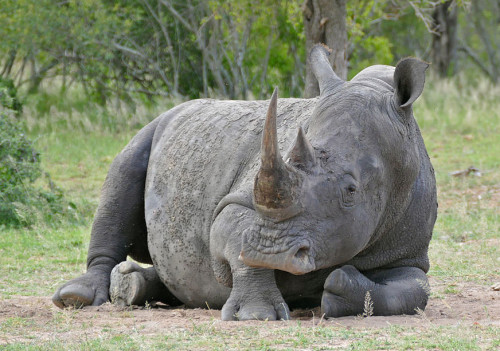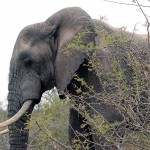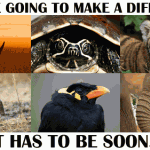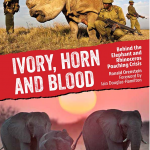
“A cynic is a man who, when he smells flowers, looks around for a coffin.” (H.L. Mencken)
I imagine some readers of my posts must look upon my ramblings and think, “Is he never happy?” And they would be perfectly entitled, and possibly justified, in doing so. But it is difficult, or at least I find it so, to accept things at face value.
Perhaps it is because I’m an ex-cop? Maybe it is because I am a dour Scot? Or that I’m a glass half-empty person by nature?
Where my suspicion kicks in is when I see, for instance, some organizations starting to claim credit for what is reported to have been a recent fall in the price of ivory in China. If the value has truly reduced, I am far from convinced, very far from convinced, that this has resulted from any demand-reduction or public-education campaigns. For one thing, I have never believed that the retail markets in places like China have been what we should be targeting or what may have been ‘driving’ the poaching of elephants. Those outlets have never, to my mind, offered an explanation for the organized criminality which has become increasingly associated with ivory trafficking in recent years. Aspects of money-laundering, speculation and hoarding have not received nearly sufficient attention. Burning or crushing ivory won’t reduce criminality either. If you want to learn more about my thoughts on this matter, you can read my book.[i]
If the cost of ivory is actually falling, we need to examine much more closely what is prompting this.
Then, we need to reflect upon how that can be exploited by the conservation and law enforcement communities. If, indeed, it can be. After all, much as we might like to think we can influence or control ‘markets’, I suggest that the current worldwide recession, price of oil, etc. maybe indicates otherwise.
I’m sure I am not alone in welcoming the news that the number of rhinos poached in South Africa last year was less than the 2014 total. A BBC news report[ii] said this was due to “increased policing and combat operations”. To be fair, the item was probably just quoting someone else’s words but how on earth did anyone determine that? How could anyone possibly determine that?
The number for 2014 was 1,215. For 2015, it is apparently 1,175. Were police and combat operations (goodness only knows what those latter two words mean) markedly different in 2015, compared with 2014?
I am not engaged in number-crunching or in devaluing the dedication of anti-poaching personnel. If the enforcement community (or others) did something that genuinely led to a difference, we need to identify what that was; and do more of it.
An incredible amount of resources, and a similar number of initiatives, have been directed towards wildlife crime in the past few years. How many of these have been subjected to critical and objective evaluation?
The ‘Wildlife Crime Tech Challenge’[iii] has just announced its “prize winners” (what a peculiar phrase to use). This initiative is intended to fund individuals and organizations who believe they can contribute to combating animal and plant trafficking through the use of innovative technology. An undoubtedly worthy project, but I cannot help be concerned that this may introduce even more initiatives into what already seems to be a terribly uncoordinated and uncollaborated mass (ought I to say mess?) of efforts.
He’s being too cynical again, I hear you say.
In response, let me tell you that I have been involved in assessing projects seeking funding and it constantly amazes, and depresses, me how very few of the applicants, having had flashes of inspiration, actually take the trouble to reach out to the law enforcement community and ask whether what they have in mind will, in practice, make a difference or is actually wanted. And let me also tell you that those offering the funding often do not take that into consideration either. The lack of liaison with law enforcers, at every level, is utterly incredible. But, hey, what do we who do the job (or used to) know? When were our views ever sought or taken into consideration?
Do I come across as bitter? I hope so. Men and women on the frontline of anti-poaching and wildlife law enforcement, whose voices went unheard for years whilst endangered species moved ever closer to extinction, probably feel frustrated too.
The NGOs, celebrities, politicians, etc. who now bask in the spotlight of attention on this subject, and who believe they have the answers, need to talk to folks on-the-ground and ask what they want and need. They might find it is not what they imagine or think it would be. There’s an awful lot of Sherlock Holmeses out there at the moment. They need to remember that the famous Baker Street Detective was a fictional character.
One hopes that the focus on combating wildlife crime will continue for the foreseeable future and that attention won’t shift elsewhere. The fact that the CITES conference takes place in September ought to help.[iv] It needs to be borne in mind, though, that current species-specific focusses risk missing the bigger, wildlife trafficking overall, picture. And if there is less profit around for organized crime, don’t for one second imagine they’ll become saints instead of sinners; their attention will simply turn to another commodity, and that commodity might well be a different form of fauna or flora.
Please let’s ensure that what we do in 2016 is coordinated and thoughtful. Let’s assess and appraise efforts constantly. If you are trying to help, reach out to those who you wish to assist and seek their input. One more smartphone application or an additional awareness campaign might appear attractive and clever but will it really make the difference?
What I have yet to see is a funding application which says, ‘This will prevent another ranger being killed.’ How many projects, for instance, seek to supply bullet-proof vests to Game Scouts?
I look forward to the glass being half-full this year. Particularly if it contains Single Malt whisky.
[i]http://www.whittlespublishing.com/The_UNs_Lone_Ranger_Combating_international_wildlife_crime
[ii] http://www.bbc.co.uk/news/world-africa-35372924
[iii] https://wildlifecrimetech.org/winners




